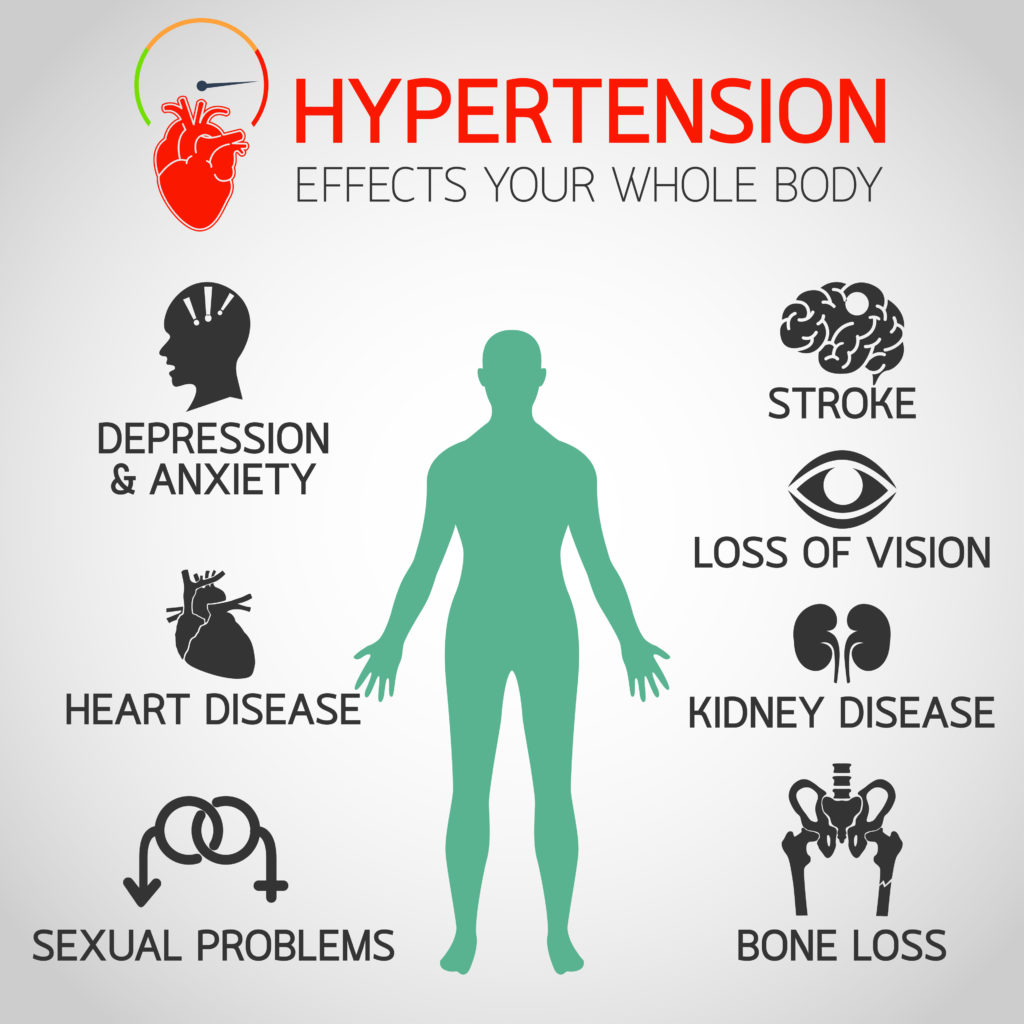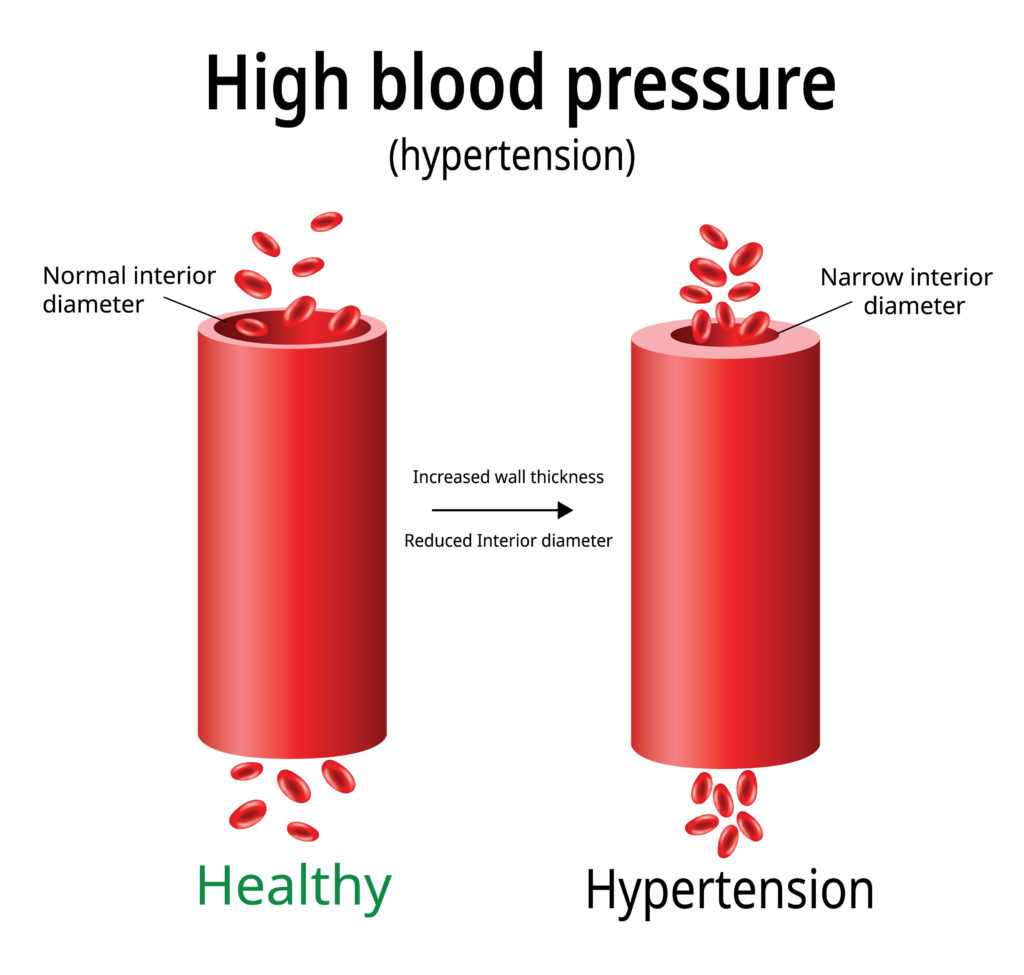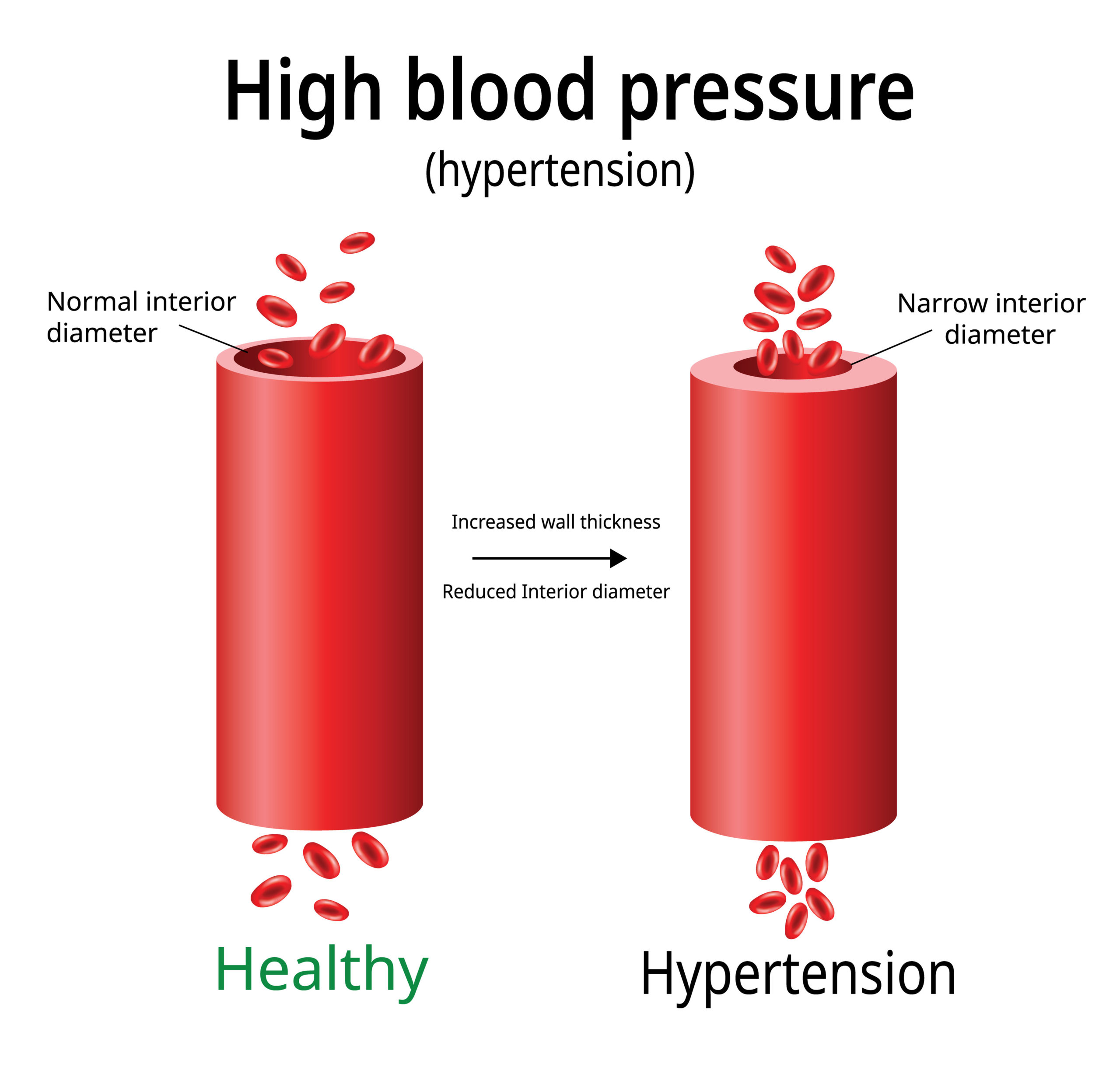High blood pressure is a known risk factor for cardiovascular disease. While medication may be needed to help get high blood pressure under control, it’s helpful to understand how to lower blood pressure naturally to prevent other health complications.
What Does Blood Pressure Tell You?
Blood pressure measures the pressure at which your blood circulates against your blood vessel walls. It’s read as one number over another. Systolic blood pressure, the top number, indicates the pressure in your arteries when your heart beats. Diastolic blood pressure, the bottom number, measures the pressure in your arteries when your heart is at rest between beats.
What if Your Blood Pressure is Too High?
Normal blood pressure reading is considered to be 120/80 mmHg or below. Both numbers don’t have to be elevated to indicate high blood pressure. You could just have a higher-than-normal diastolic or systolic reading to diagnose high blood pressure.
Structural changes in the arteries occur when blood pressure reaches 130/80 mmHg and above. Doctors generally only begin blood pressure medication when levels reach 140/80 mmHg, but damage may already be done at this point. Lifestyle and nutrition can be immensely impactful at this time to help reverse cardiovascular complications.
High blood pressure can cause a bulge, or aneurysm, in an artery that grows over time. Eventually, this can rupture — which can be deadly. Furthermore, uncontrolled high blood pressure can result in a stroke, heart or kidney failure, sexual dysfunction, bone loss, and vascular dementia, cognitive changes from blood vessel damage in the brain.
These are all reasons to keep blood pressure normal through proactive lifestyle measures like nutrition. It’s also a good idea to regularly test your blood pressure levels with a home monitor, especially if you’re at a higher risk or if you have a history of white coat syndrome — an increase in blood pressure readings in the presence of a doctor or other healthcare provider.

What Causes High Blood Pressure?
High blood pressure can be caused by many things, like:
- Unbalanced nutrition
- Overweight or obesity
- Underlying health conditions like diabetes, chronic kidney disease, or cardiovascular irregularities
- Sedentary lifestyle
- Heavy alcohol consumption
- Excessive salt intake
- Smoking
- Lack of sleep
- Genetic predisposition
- Certain medications
What is Resistant Hypertension?
Some people experience resistant hypertension, which is when they are on 3 or more antihypertensive medications — usually a long-acting calcium channel blocker, an angiotensin-converting enzyme inhibitor, and a diuretic — and still have high blood pressure.
Taking a close look at lifestyle interventions is critical in any case of hypertension. It’s important not to overlook the influence of nutrition and solely focus on medication, which leads me to a client story to illustrate this point.
Client Success Story
A 60-year-old woman came to see me because she had resistant hypertension, persistently elevated blood pressure readings (average was 159/95 mmHg), despite being on three blood pressure medications. She took an online cholesterol course, but it didn’t impact her blood pressure.
We worked closely together in my VIP program to create a realistic lifestyle plan to achieve her goals. We worked on her nutrition by focusing on adding many therapeutic foods to help optimize her blood vessel health and lower her blood pressure. We focused on foods that help to relax her arteries while reducing others that cause constriction. This allows for a reduced burden on her heart and allows for better blood flow. We also optimized her sleep by facilitating natural melatonin production through food and lifestyle changes. Her stress and physical movement were previously optimized.
In 4 weeks, her average blood pressure was 135/91 mmHg, a 28-point decrease. In 8 weeks, her average was 124/79 mmHg, a 51-point decrease from her start. Her average at the end of 12 weeks was 118/75 mmHg, a 61-point decrease from the start! She has maintained these values, and her doctor has removed 2 of the 3 blood pressure medications, while significantly reducing the third one!
How to Lower Blood Pressure Naturally
If you’re experiencing high blood pressure, there are some natural ways to help reduce your levels. As you put these into practice, continue to follow guidance from your healthcare team, as it’s a team effort to monitor your blood pressure. Work with your registered dietitian who specializes in heart disease, and consult with your doctor for adjustments in medication as needed. Blood pressure medication can be life-saving, but lifestyle can also play a big role in reducing them along with your doctor’s guidance.
Manage Your Stress
When under stress, your body produces a surge of hormones, which can temporarily increase your blood pressure as your blood vessels narrow and your heart rate quickens. Over time, this can lead to hypertension. If you find yourself frequently stressed, incorporating breathwork or a mindfulness practice can be helpful. Anything that can increase your presence in the moment, calm your mind, and slow your heart rate can help reduce stress and blood pressure.
Enjoy Regular Physical Activity
Aerobic exercise and resistance training are good for you but can temporarily increase blood pressure, as your heart pumps faster to provide more oxygen. For most healthy people, blood pressure will return to normal within a few hours after exercise, but people with hypertension can experience more dramatic changes. Knowing how your body responds to different movements is important. Wearing a blood pressure monitor may be able to help you identify patterns, which should be discussed and individualized with your healthcare team.
Stop Smoking
The addictive substance in cigarettes, nicotine, causes a temporary increase in blood pressure. It activates your sympathetic nervous system, which is in charge of your stress and danger response. Every time you smoke, this activation triggers hormonal signals that move extra blood to your muscles, increasing alertness, tension, and, ultimately, blood pressure. There is some evidence that e-cigarettes, or vaping, also promote hypertension.
Improve Your Sleep
While you sleep, your body repairs and rejuvenates. Sleep is also a time for your body to regulate hormones like cortisol, which is associated with stress. When you’re not getting adequate sleep, this regulation can’t happen effectively, which can promote higher blood pressure. Experts recommend 7-8 hours of sleep for most adults every night. Getting enough sleep requires improving your body’s natural circadian rhythm or sleep-wake cycle.
Go to bed and wake yourself up around the same time, even on the weekends. Avoid eating and using technology within two hours of bedtime, as the latter emits blue light that disrupts melatonin production.
Feed Your Body Well
Good nutrition is the foundation for a healthy heart and overall wellness. Emphasize whole and minimally processed foods as much as possible, minimizing foods high in added sugar, sodium, and saturated fat. Choose foods that help reduce the burden on your heart and allow for good blood flow. Stay hydrated by drinking enough water.

We’ll cover some specific nutrients for blood pressure next.
Nutrients of Focus for Healthy Blood Pressure
When blood pressure is high, we hear most about what types of foods to avoid. But there are also plenty of foods to eat more of to help improve blood pressure. Consider the following nutrients for supporting healthy blood pressure.
- Sodium: Salt gets the most attention when talking about blood pressure, as excessive sodium promotes hypertension. This is because it causes the body to hold onto extra fluid, increasing blood pressure and making the heart work harder. Many frozen, canned, and packaged foods have high amounts of salt. Read labels to choose items with less than 140 mg of sodium per serving and avoid adding salt when cooking.
- Potassium: Boosting potassium intake while reducing sodium has been shown to help reduce high blood pressure. Potassium and sodium need to be balanced, and potassium helps blunt the adverse effects of sodium on blood pressure, evening it out. Find potassium in foods like white potatoes, sweet potatoes, avocados, yogurt, salmon, and lentils.
- Magnesium: Magnesium is key for blood pressure regulation because it helps blood vessels relax. Not getting enough has been associated with a higher risk of hypertension. Find magnesium in legumes, greens, nuts, seeds, and whole grains.
- Calcium: Calcium helps blood vessels contract and relax when they need to and is heavily involved in blood pressure regulation. Sources include yogurt, specific greens, calcium-set tofu, and almonds. Get it from foods, as supplemental calcium may have a negative effect on heart health.
- L-arginine: This amino acid is necessary for the production of nitric oxide, which relaxes vessels and lowers blood pressure. It’s found in foods like specific nuts and seeds, such as walnuts and sesame seeds.
- Fiber: Getting enough fiber helps reduce high blood pressure, as high-fiber foods also tend to be rich in beneficial vitamins and minerals, and low in sodium. Fiber is only found in plant foods. Adding more fruits, vegetables, grains, nuts, seeds, and legumes to your diet can make a big difference.
I recommend starting with food to get these nutrients for optimal arterial health and effective blood pressure-lowering effects. Some supplements may be appropriate for lowering blood pressure but need to be personalized to your individual needs.
If you are in need of more support on your heart health journey to lower blood pressure naturally, I would be happy to help you. If you are interested in working together 1 on 1, please schedule a 15-minute complimentary discovery call using this link. We will work closely together to pinpoint what may be troubling you to reach your goals and I will help guide you on specifics for you to lower your blood pressure effectively, reduce cardiovascular complications, and support your heart health.
References
- Pioli MR, Ritter AM, de Faria AP, Modolo R. White coat syndrome and its variations: differences and clinical impact. Integr Blood Press Control. 2018;11:73-79. Published 2018 Nov 8. doi:10.2147/IBPC.S152761
- Carey RM, Calhoun DA, Bakris GL, et al. Resistant Hypertension: Detection, Evaluation, and Management: A Scientific Statement From the American Heart Association. Hypertension. 2018;72(5):e53-e90. doi:10.1161/HYP.0000000000000084
- Liu MY, Li N, Li WA, Khan H. Association between psychosocial stress and hypertension: a systematic review and meta-analysis. Neurol Res. 2017;39(6):573-580. doi:10.1080/01616412.2017.1317904
- Miller CR, Shi H, Li D, Goniewicz ML. Cross-Sectional Associations of Smoking and E-cigarette Use with Self-Reported Diagnosed Hypertension: Findings from Wave 3 of the Population Assessment of Tobacco and Health Study. Toxics. 2021;9(3):52. Published 2021 Mar 9. doi:10.3390/toxics9030052
- Makarem N, Alcántara C, Williams N, Bello NA, Abdalla M. Effect of Sleep Disturbances on Blood Pressure. Hypertension. 2021;77(4):1036-1046. doi:10.1161/HYPERTENSIONAHA.120.14479
- Hirshkowitz M, Whiton K, Albert SM, et al. National Sleep Foundation’s sleep time duration recommendations: methodology and results summary. Sleep Health. 2015;1(1):40-43. doi:10.1016/j.sleh.2014.12.010
- Grillo A, Salvi L, Coruzzi P, Salvi P, Parati G. Sodium Intake and Hypertension. Nutrients. 2019;11(9):1970. Published 2019 Aug 21. doi:10.3390/nu11091970
- Newberry SJ, Chung M, Anderson CAM, et al. Sodium and Potassium Intake: Effects on Chronic Disease Outcomes and Risks [Internet]. Rockville (MD): Agency for Healthcare Research and Quality (US); 2018 Jun. (Comparative Effectiveness Review, No. 206.) Available from: https://www.ncbi.nlm.nih.gov/books/NBK519328/
- Schutten JC, Joosten MM, de Borst MH, Bakker SJL. Magnesium and Blood Pressure: A Physiology-Based Approach. Adv Chronic Kidney Dis. 2018;25(3):244-250. doi:10.1053/j.ackd.2017.12.003
- Tankeu AT, Ndip Agbor V, Noubiap JJ. Calcium supplementation and cardiovascular risk: A rising concern. J Clin Hypertens (Greenwich). 2017;19(6):640-646. doi:10.1111/jch.13010
- Wu G, Meininger CJ, McNeal CJ, Bazer FW, Rhoads JM. Role of L-Arginine in Nitric Oxide Synthesis and Health in Humans. Adv Exp Med Biol. 2021;1332:167-187. doi:10.1007/978-3-030-74180-8_10
Aleixandre A, Miguel M. Dietary fiber and blood pressure control. Food Funct. 2016;7(4):1864-1871. doi:10.1039/c5fo00950b
